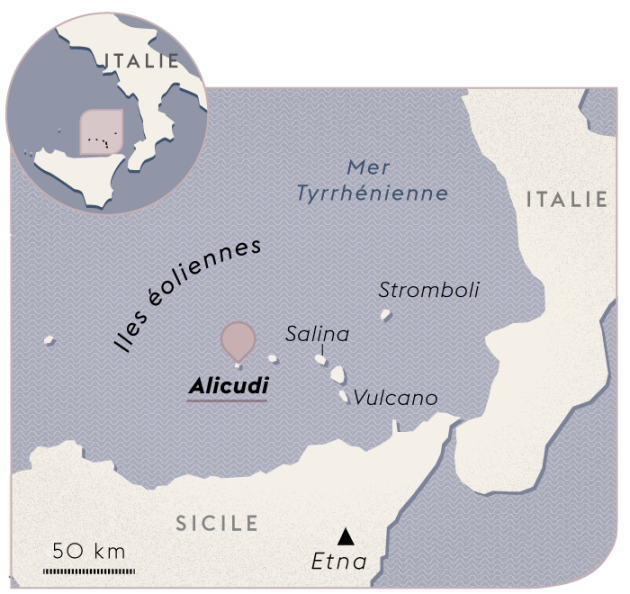Alicudi deserves. Reaching the wildest and most remote Aeolian Island, north of the Sicilian shores, is a journey in itself. The meteorological vagaries of the Tyrrhenian Sea, the hours by boat from the ports of Palermo or Milazzo complicate the path. But, at the end of the journey, as if by a miracle, Alicudi appears. And the imposing ferry or the fragile hydrofoil star moors with difficulty to the simple concrete plate which acts as a port.
On only one side of the island, the few dwellings, mostly white, are placed on the hillside, almost in balance. No sandy beach softens this decor. Only one hotel opens at the end of spring and a small grocery store provides water and food supplies. Here, 80 inhabitants lead a life of island harshness, without running water or mains drainage.
Most of the aquatic reserves are transported by boat, the recovery of rainwater fills the rest. Only courageous mules climb the goods and the suitcases up to the heights of the island, facing old stony and steep stairs which surround the volcanic island with a 700 meter drop.
Alicudi only experienced electricity and the telephone in the 1990s. Personal diary, in 1993, the Italian director Nanni Moretti found there the meditative refuge he had hoped for after having traveled to the other Aeolian Islands. Conversely, his traveling companion in the film, frightened by Alicudi’s austerity, runs down the stone stairs just as dryly to get back on the ferry. “It continues to happen regularly. Some tourists, poorly informed, are panicked by the roughness of life they discover and, therefore, they have only one idea in mind: to escape from here as quickly as possible.says Roberto Longo, an Italian painter living on the island.
With neighbors as touristy as Stromboli, Vulcano or Salina, Alicudi’s hostility can, indeed, be disconcerting. The modernity of the contemporary world seems to have little hold on the island. “This is precisely what you have to accept in order to be able to live here”, confides Roberto Longo, who recounts the incomprehension of some of his friends in the face of the daily life he has built up here for fifteen years. He first discovered Alicudi as a tourist, before gradually becoming fascinated by this piece of land. “I was magnetized by the breathtaking views, the rhythm of life apart, the silence too”he explains.
The possibility of acquiring a small house to retype there is emerging. Perched high up, the Monachedda (“the little nun”) was originally the home of an elderly woman, very religious and solitary, that everyone took care of on the island. To get there, you have to climb the stairs steeply and then descend a few protruding steps barely visible in the untamed grass. Roberto Longo often has to go out to meet his lost guests on the way. “Everything that puts some people off at Alicudi appealed to me. I felt that I had something to live there. It was a very strong, very intimate call.remembers this native Neapolitan, in his fifties. “I have always loved islands. When I was little, it was Capri that fascinated me from the Bay of Naples. »
You have 60.64% of this article left to read. The following is for subscribers only.
